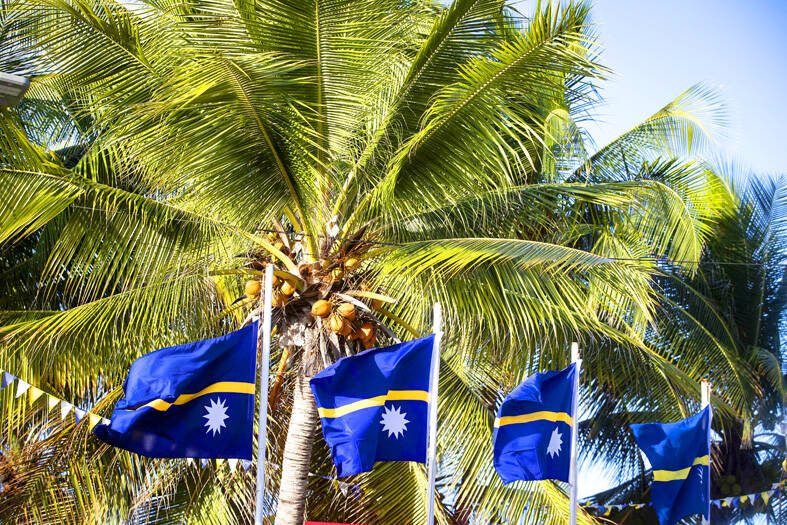A Taiwanese conscript previously under investigation for allegedly burning a Nauru national flag after the countries cut diplomatic ties in January has safely returned to Taiwan on Saturday, meaning all Taiwanese nationals have now returned from the Pacific island nation.
The unnamed conscript, previously on an alternative military service in Taiwan’s diplomatic corps in Nauru, was accompanied home by a Taiwanese diplomat on Saturday morning, the Ministry of Foreign Affairs on Saturday said in a statement.
The conscript was accused of burning a Nauru national flag while he and other embassy staffers were destroying sensitive official documents after diplomatic relations were ended on Jan. 15, the ministry said.

Photo: AP)
He was then asked to stay in Nauru, as local police investigated the allegation, the statement said.
The ministry hired a lawyer to assist the conscript and ensure that his legal rights were protected, it said, adding that the conscript remained free and was allowed to communicate with the outside world without restrictions.
Given that legal proceedings recently concluded, the conscript was permitted to leave Nauru, it said.
He was one of three conscripts doing alternative military service in Nauru and part of the 15 Taiwanese diplomats, technical staffers and family members who were in the Pacific country when both governments ended official relations.
In Taiwan, men have to undergo a compulsory military service. However, they can enter into a lottery draw to do alternative service instead, which includes serving in Taiwan’s diplomatic corps abroad.
There are no more Taiwanese expatriates or businesspeople in Nauru, so the conscript’s homecoming means that all Taiwanese have now left the territory of the former ally, the ministry said.
The severing of ties between Taiwan and Nauru came two days after Vice President William Lai (賴清德) of the Democratic Progressive Party was elected president. It left the nation with only 12 remaining diplomatic allies.
Nauru was also the 10th diplomatic ally Taipei lost to Beijing since President Tsai Ing-wen (蔡英文) took office in May 2016, amid deteriorating cross-strait relations.

STAY AWAY: An official said people should avoid disturbing snakes, as most do not actively attack humans, but would react defensively if threatened Taitung County authorities yesterday urged the public to stay vigilant and avoid disturbing snakes in the wild, following five reported snakebite cases in the county so far this year. Taitung County Fire Department secretary Lin Chien-cheng (林建誠) said two of the cases were in Donghe Township (東河) and involved the Taiwan habus, one person was bit by a Chinese pit viper near the South Link Railway and the remaining two were caused by unidentified snakes. He advised residents near fields to be cautious of snakes hiding in shady indoor areas, especially when entering or leaving their homes at night. In case of a

A magnitude 6.4 earthquake struck off the coast of Hualien County in eastern Taiwan at 7pm yesterday, the Central Weather Administration (CWA) said. The epicenter of the temblor was at sea, about 69.9km south of Hualien County Hall, at a depth of 30.9km, it said. There were no immediate reports of damage resulting from the quake. The earthquake’s intensity, which gauges the actual effect of a temblor, was highest in Taitung County’s Changbin Township (長濱), where it measured 5 on Taiwan’s seven-tier intensity scale. The quake also measured an intensity of 4 in Hualien, Nantou, Chiayi, Yunlin, Changhua and Miaoli counties, as well as

Credit departments of farmers’ and fishers’ associations blocked a total of more than NT$180 million (US$6.01 million) from being lost to scams last year, National Police Agency (NPA) data showed. The Agricultural Finance Agency (AFA) said last week that staff of farmers’ and fishers’ associations’ credit departments are required to implement fraud prevention measures when they serve clients at the counter. They would ask clients about personal financial management activities whenever they suspect there might be a fraud situation, and would immediately report the incident to local authorities, which would send police officers to the site to help, it said. NPA data showed

ENERGY RESILIENCE: Although Alaska is open for investments, Taiwan is sourcing its gas from the Middle East, and the sea routes carry risks, Ho Cheng-hui said US government officials’ high-profile reception of a Taiwanese representative at the Alaska Sustainable Energy Conference indicated the emergence of an Indo-Pacific energy resilience alliance, an academic said. Presidential Office Secretary-General Pan Men-an (潘孟安) attended the conference in Alaska on Thursday last week at the invitation of the US government. Pan visited oil and gas facilities with senior US officials, including US Secretary of the Interior Doug Burgum, US Secretary of Energy Chris Wright, Alaska Governor Mike Dunleavy and US Senator Daniel Sullivan. Pan attending the conference on behalf of President William Lai (賴清德) shows a significant elevation in diplomatic representation,